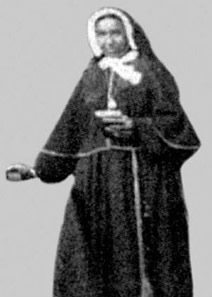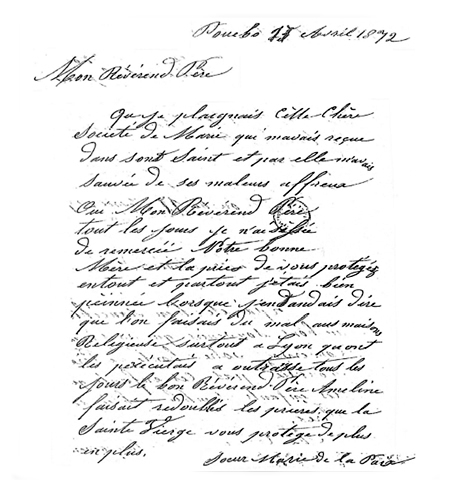04/09/2025
Needs of the Church, the Congregation and the world
04/09/2025
Needs of the Church, the Congregation and the world
04/09/2025
Prayer Intentions of the Pope
04/09/2025
Prayer Intentions of the Pope
06/08/2025
Deceased Sister: Sr. Gail Mary Colquhoun
23/07/2025
Deceased Sister: Sr. Malia Elisapeta Tapusoa (Matalena Tapusoa)
23/07/2025
Deceased Sister: Sr. Ana Marzolo (Linda Ann Marzolo)






Our pioneers | The Vocation of the Pioneers
 Much of what we would like to know about Marie-Virginie will remain in the obscurity of history as she has not left us many letters to tell us much about herself, her family and her life either as a TOMMO or a TORM. We do know she was received as a novice in the Fraternity of Christian Virgins in Lyon on 26 May 1856 and made profession the following 8 December. However, drawn as she says by “an interior voice”, she felt God calling her to something more - to leave all for Oceania. With Marie de la Croix and Marie de Bon Secours she left from London in July 1858, assuring Fr Poupinel she was “ready for all sacrifices,” and wanted “to do all that the good Lord demands of me” (Paix-Poupinel, 16.05.1858, Letter 1, §3, OPS I, 77a).
Much of what we would like to know about Marie-Virginie will remain in the obscurity of history as she has not left us many letters to tell us much about herself, her family and her life either as a TOMMO or a TORM. We do know she was received as a novice in the Fraternity of Christian Virgins in Lyon on 26 May 1856 and made profession the following 8 December. However, drawn as she says by “an interior voice”, she felt God calling her to something more - to leave all for Oceania. With Marie de la Croix and Marie de Bon Secours she left from London in July 1858, assuring Fr Poupinel she was “ready for all sacrifices,” and wanted “to do all that the good Lord demands of me” (Paix-Poupinel, 16.05.1858, Letter 1, §3, OPS I, 77a).
Missionary life for her began at La Conception (New Caledonia). Within a very short time, her two companions were sent to the Isle of Pines. She was left alone to care for the school, the church and to look after the sick. Although she found “the girls good companions,” she felt keenly the separation and isolation. She also suffered from a lack of formal instruction but Fr Rougeyron helped her to prepare her French lessons. The children loved her. In a very touching way, they expressed it on one occasion by offering her money. As they were so poor, she felt she could not accept it. On the suggestion of the priest, who told the children she worked for God and not for recompense on earth, it was given to the Propagation of the Faith. The question was settled this way (cf. Paix-Yardin, 27.08.1860, Letter 12, §4, OPS I, 197).
Marie de la Paix apparently took very good care of the sick, knowing “her strength came from God”. When an epidemic was raging in La Conception, she writes of having “had to hurry from house to house bringing remedies” to the sick and helping the dying (Paix-Hélion, 24.04.1861, Letter 14, §3, OPS II, 225).
She had desired religious life from a very early age. She expressed disappointment with the letters of M. Marie du Coeur de Jesus fearing she would not be considered capable, but according to Fr Poupinel she was “afraid to enter the congregation” (Poupinel-Yardin, 07.11.1865, OPS II, 401). There is no record of any acceptance.
In 1867, Marie de la Paix pioneered the work of the school at Pouébo where she remained until 1879. Her work there drew the admiration of Fr Rougeyron who wrote that she was “filled with zeal and good will but is deficient in learning and education” (Rougeyron-Favre, 10.09.1867, OPS III, 476).
During the fighting that broke out there, the wounded were brought to her for care. She was falsely accused there of “exciting the revolts by cutting off the head of the corpse of Hippolyte Bonou” - an accusation that hurt her deeply (cf. Espérance-M. du Coeur de Jésus, 03.03.1868, Letter 43, §4*). Her love for Mary and confidence in her protection, whom she always called “my Mother” never waned even in such difficulties.
It was in 1882 when stationed in Ouvéa, her health deteriorated and things proved too much for her. Suffering already from acute anaemia and violent headaches, she had a breakdown in mental health from which she never seems to have fully recovered. She died in the Ile des Pins in 1896.

How I pity this dear Society of Mary that has taken me into her holy [heart], and by that has saved me from frightful misfortunes. Yes, Reverend Father, every day I thank our good Mother and beg her to protect you in every way and everywhere. I felt bad when I heard the religious houses have been made to suffer terrible persecutions, especially those in Lyon. Every day Rev. Fr Ameline has had us redouble our prayers that the Blessed Virgin will protect you more and more. (Paix-Poupinel, 17.04.1872, OPS III, 595).
2896 visits